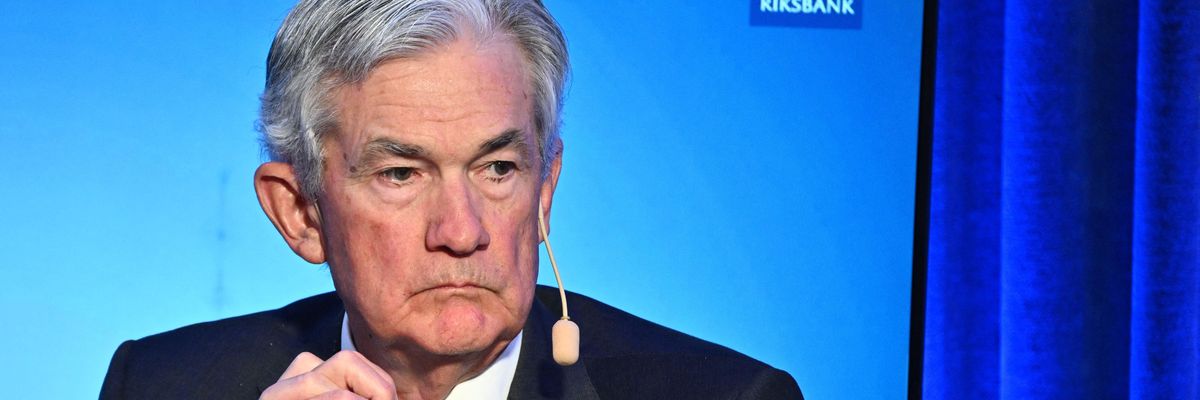Federal data released Thursday showed that the U.S. inflation rate declined in December and slowed to its lowest level in more than a year, prompting a fresh round of calls for the Federal Reserve to pause its interest rate hikes before it needlessly induces mass layoffs.
"Inflation has slowed for six months, providing families more breathing room," said Sen. Elizabeth Warren (D-Mass.), one of the most outspoken critics of Fed policy in Congress. "The Fed needs to take this data into account and not drive the economy off a cliff with more extreme interest rate hikes."
According to the new consumer price index (CPI) figures published by the Bureau of Labor Statistics, inflation fell 0.1% in December compared to the previous month as prices continued to drop or moderate across a variety of sectors, from groceries to used vehicles. (Housing inflation, a lagging indicator, remained elevated in December, but experts expect it to fall in the coming months as the Fed's rate hikes take their toll on the economy.)
At an annualized rate, CPI climbed 6.5% through December, down from 7.1% in November.
"There is no period in which the Fed pursued a deflationary policy in which low-income people won."
"We always need caution when looking at a single month's report, but the good December CPI report follows several months in which inflation has slowed sharply from the pace earlier in the year. All the evidence suggests that the economy is still growing at solid pace," Dean Baker, senior economist at the Center for Economic and Policy Research, wrote in a blog post Thursday.
Baker pointed out that with the latest data, the annualized inflation rate over the last three months was just 1.8%—within the Fed's target rate of 2%.
"It looks like the Fed has largely accomplished its mission of taming inflation, without bringing on a recession," Baker added. "Plenty of things can mess up this picture, like another surge of Covid or an escalation of the war in Ukraine, but for now, the economy is looking very good."
There's also the risk that the Fed—not satisfied with the rate of inflation's decline—continues to aggressively raise interest rates, slamming the brakes on the still-strong economy and potentially throwing millions out of work without tackling many of the primary drivers of price increases, including corporate profiteering.
Rakeen Mabud, chief economist at the Groundwork Collaborative, pointed to that possibility in a statement Thursday, arguing that Fed Chair Jerome Powell "should stop further rate hikes before he engineers a totally unnecessary recession."
"Today's CPI report makes it crystal clear that we don't need mass joblessness to bring down inflation," said Mabud. "Further interest rate hikes will only weaken our economy, and the most vulnerable workers will be the ones to pay the biggest price."
If the minutes from last month's Fed meeting and recent remarks from Powell are any indication, central bank policymakers have no intention of pausing rate hikes at their early February meeting even as their own projections signal potentially massive job losses in the near future—though some officials have expressed support for smaller rate hikes in the coming months.
In a speech on Tuesday, Powell—who has explicitly said he's trying to weaken the labor market and cut workers' wages—declared that "restoring price stability when inflation is high can require measures that are not popular in the short term as we raise interest rates to slow the economy."
Such comments and the policy steps the Fed has over the past year—rapidly driving up interest rates to their highest level in 15 years—have analysts convinced that the central bank is "trying to engineer a recession," which would have disproportionate impacts on low-income workers.
Wage growth and hiring have both slowed in recent months, according to Labor Department data.
"Though they may proclaim otherwise, the Fed is aiming for a recessionary labor market," Alex Williams, a senior economist at Employ America, wrote Monday.
"They might not succeed, they might change their minds, but buried in the Fed's latest projections is a definite—albeit obscured—statement of intent," Williams continued. "The Fed is projecting that the unemployment rate—which reached a low of 3.5% in December—will increase by at least a percentage point (to 4.6%!) by the end of 2023 under 'appropriate monetary policy.' The unemployment rate has only increased by 1% within a year twelve times since World War II. Every time, (1) we saw a recession, (2) the unemployment rate continued to increase far beyond the initial 1%."
"Simple back-of-the-envelope math says that a 1% increase in the unemployment rate represents a net loss of nearly 1.5 million jobs over one year, assuming the Labor Force Participation Rate (LFPR) holds steady," Williams added. "If LFPR falls with employment, as it traditionally has during recessions, the Fed could plausibly be targeting as many as 2 million jobs lost or foregone."
William Spriggs, the AFL-CIO's chief economist, told The New York Times Magazine earlier this week that "if you become unemployed" as a result of the Fed's efforts to tamp down price increases, "then all bets are off, because you can't afford anything."
"There is no period in which the Fed pursued a deflationary policy in which low-income people won," Spriggs said. "The median income of Black families falls, and it takes years to come back. Child poverty spikes."




